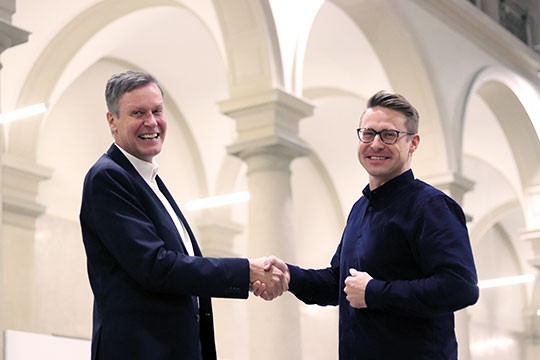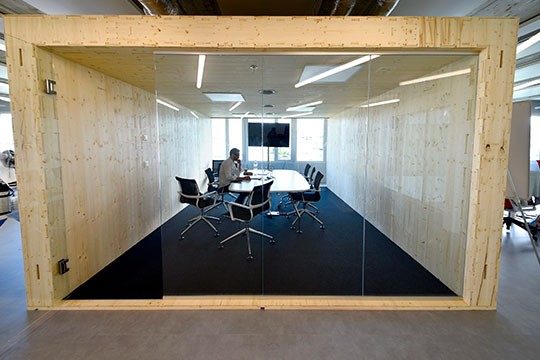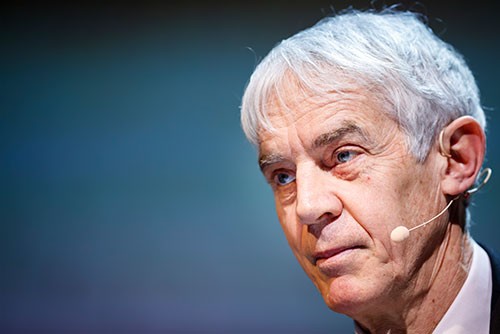
Having long ceased to be the subject of utopian films, artificial intelligence (AI) is a firm fixture in our daily lives. Voice assistants like Alexa or Siri answer questions, Spotify automatically composes playlists and Facebook recognises the content of uploaded photos. We are frequently unaware than AI is behind these applications. Even fewer know how AI affects their decisions. It sounds preposterous, but even programmers cannot always identify the logic by which AI makes its decisions. We call this effect the blackbox. We know the data we feed AI and we know the results it yields – however, what happens in between is often beyond our ken.
When is a train not a train?
AI does not always draw on the facts the programmers would like it to use. Scientists at the Fraunhofer Heinrich-Hertz Institute in Berlin examined an AI application that is designed to recognise trains on photos. They were able to prove that the program mainly focused on tracks and the edge of the platform; the trains themselves were of secondary importance to the neural network. The software might therefore recognise a pigeon as a train if one happened to be sitting on a deserted platform. A neural network intended to recognise photos of horses also caused surprise: ignoring the shape of the horses, AI focused instead on the copyright details. In both cases, the network was capable of correctly categorising many photos, only to suddenly fail spectacularly and completely without warning. What may yield a certain entertainment value in the case of trains and horses, can have serious consequences in a medical context. “That’s why it is important for us to follow how the AI we use works,” explains Michael Baeriswyl, Head of Data, Analytics & AI at Swisscom. Swisscom entered into a partnership with ETH Zurich to pursue the matter. The scientists researched the intelligent systems used by Swisscom such as e-mail triage and chatbots for a period of three years.

Prof. Georg von Krogh, Chair of Strategic Management and Innovation at ETH Zurich, and Michael Baeriswyl, Head of the Data, Analytics & AI division at Swisscom, look forward to the three-year research project into the acceptance of intelligent systems.
Inside the blackbox
Swisscom has been using various systems based on artificial intelligence for quite some time to offer its customers the fastest, most personalised service possible. People are needed to develop and train these systems – however their (for the most part unconscious) prejudices may under certain circumstances be reflected in the systems. So there is a risk that AI will not make fair decisions. Georg von Krogh is a professor at ETH Zurich and holds the Chair of Strategic Management and Innovation. He has been researching digital innovations for more than a decade. He is in no doubt: “We need to understand the dynamics of AI far better than we do today in order to deploy it profitably in companies.” Besides looking into the blackbox and eliminating human prejudices, von Krogh is mainly concerned with helping customers, employees and management to use AI. This sometimes means breaking with established organisational (decision-making) patterns and launching new projects.
“Intelligent systems only become more exact when they are accepted by people and integrated into daily life.”
Prof. Georg von Krogh, Chair of Strategic Management and Innovation at ETH Zurich
“Intelligent systems only become more exact when they are accepted by people and integrated into daily life.” This would then enable them to have a direct, positive influence on employee productivity and coordination. In von Krogh’s opinion, this, in turn, would lead to happier, more motivated employees and more loyal customers. During the three-year research project, ETH therefore examined various structures and incentives designed to increase the acceptance and popularity of Swisscom’s intelligent systems among employees. Baeriswyl: “We hope not only to optimise our AI through these insights, but also to better address the fears of our employees and customers.”

The Digital Lab was opened by Swisscom at the Innovations Park on the EPFL campus in 2016, and more than a dozen research results have been jointly published by Swisscom and the EPFL since then. MANUEL LOPEZ KEYSTONE
At the heart of EPFL
Swisscom also works closely with other universities to benefit from the latest scientific findings and thus develop continuously. One such institution is the École Polytechnique Fédérale de Lausanne (EPFL): In 2016 Swisscom opened the Digital Lab on its campus. In the Competence Centre for Digitisation, EPFL researchers and Swisscom employees work hand in hand on the technologies of the future. It is an exchange from which all draw benefit.
In the barely three years of cooperation, many research projects have been initiated, later to be directly incorporated into the business. They are distinguished by their diversity: a machine learning project devoted to detecting irregularities in the Swisscom mobile network, another focusing on secure authentication with Mobile ID, while a third tries to add a more human touch to interaction between customers and AI. Work includes converting old films into high definition video sequences and checking the climate in sensitive library rooms via IoT. So far, more than forty Masters students have collaborated on these projects – and several of them now work for Swisscom. Guillermo Barrenetxea, Open Innovation Director in the Swisscom Digital Lab, is thrilled by the close collaboration: “We benefit from each other on a daily basis: the students can follow up real-life issues and gain a practical insight into the business world. We, on the other hand, can directly incorporate the latest research findings into our products and services.” EPFL and Swisscom have jointly published more than a dozen research results at international conferences, and EPFL has awarded Swisscom the prize for the best company on the campus.
Other companies are also inspired by the atmosphere. In recent months, more than sixty companies have visited the Swisscom Digital Lab. Barrenetxea: “However, they find more than just inspiration here. We demonstrate the latest technical achievements in our workshops, not to mention setting up contacts to EPFL professors and Masters students. Even Federal councillor Johann Schneider-Ammann has benefited from the cooperation.”
The crux: Swiss German
Like for every company, it is vital that Swisscom speaks the same language as its customers. But what happens, if most of the people addressed speak Swiss German – a vernacular spoken in various dialects? Swisscom is working with various universities to decipher Swiss German. Swisscom and Zurich University are compiling a dictionary designed to help understand the fine nuances between dialects and map the various pronunciations. Along with the Haute École de Fribourg they are testing automatic text translation between Swiss and High German, while with the Idiap Research Institute Swisscom is analysing the morphological structure of Swiss German. In this way, pronunciation and the written form of Swiss German can be better mapped, and links created to High German equivalents. Baeriswyl: “Thanks to all these partnerships, we are gradually decoding and digitising Swiss German. In the future, our customers will be able to talk to the chatbot in Swiss German or explain their problem to the hotline in dialect. Our artificial intelligence will understand them and suggest the appropriate solutions.”
Cooperation with universities is not confined to Europe. In August 2018, Swisscom launched a joint research project with the MIT Sloan School of Management in the USA, where the latest research methods in process and data analysis are applied and analysed. Special emphasis is placed on data security in companies and data anonymisation prior to evaluation. “We work with the best research institutions to ensure that we lead the way in the application of AI in Switzerland. We are fully committed to cooperation and open innovation and aim to continue extending these partnerships in the future,” says Baeriswyl.
Prof. Martin Vetterli, President of the EPFL
“Swisscom has set new standards.”

In the interview, Prof. Martin Vetterli, President of the EPFL, explains more about the productive and intensive research collaboration between Swisscom and the EPFL. VALENTIN FLAURAUD KEYSTONE
Why is the Swisscom-EPFL collaboration a win-win story for both parties?
On the one hand, Swisscom provides EPFL’s researchers with a privileged access to inspiring challenges, case studies and datasets. On the other hand, EPFL promotes technology transfer from its research laboratories into Swisscom’s new innovative solutions and products (such as Swisscom Mobility Insights) as well as interactions with students through internships, and master projects.
Beyond intensive technology transfer through numerous joint research projects between Swisscom and EPFL, Swisscom’s presence on EPFL’s Innovation Park also facilitates the recruitment of new talents who freshly obtained a Master or a PhD degree from EPFL.
Why did EPFL award Swisscom as the most active company on campus?
Since its opening at EPFL Innovation Park less than 3 years ago, the Swisscom Digital Lab has been extremely active in organising networking events in order to gather the various communities from EPFL’s innovation ecosystem, namely students, researchers, entrepreneurs as well as representatives from established corporate companies present on campus.
For instance, over 1500 people are part of the meetup community created by the Swisscom Digital Lab (one of the largest and most active in Switzerland) and our students and researchers love to participate in these events.
Beyond meetup events, the Swisscom Digital Lab organises a wide range of outreaching activities related to challenges of digitalisation, from bootcamps to tech happy hours with expert talks.
Overall, the Swisscom Digital Lab is super dynamic and creative in terms of community building.
What can other companies learn from the Swisscom-EPFL collaboration?
The Swisscom Digital Lab has somehow defined a new benchmark among corporate companies located at EPFL’s Innovation Park. It shows the multiple ways to best benefit from a presence on campus, namely research projects with EPFL labs, contribution to strategic EPFL educational initiatives such as the Swiss EdTech Collider or the Extension School, hosting of interns and master projects, joint events co-organised with EPFL on topics related to digitalisation… and much more!
Further training at EPFL
Vast quantities of data are generated and processed at Swisscom every day. So it is particularly important to the company that all its employees know how to handle data correctly and responsibly. Swisscom trains employees regularly. It is now offering a course for data newcomers and professionals alike, in conjunction with the EPFL Extension School. After all, Swisscom has set itself the target of becoming a data-driven company. This also means that before taking a decision, the relevant data is analysed and AI approaches for optimum customer experiences or process automation are used. Baeriswyl: “We want to make data and AI a part of the Swisscom culture – and we work with the best to provide our employee training.” In the coming two years, a thousand more Swisscom employees are going to learn how to use data and AI unaided, and deploy it appropriately and securely.
Contact us
Address
Swisscom
Media Relations
Alte Tiefenaustrasse 6
3048 Worblaufen
Postal address:
Postfach, CH-3050 Bern
Switzerland
Contact
Tel. +41 58 221 98 04
media@swisscom.com